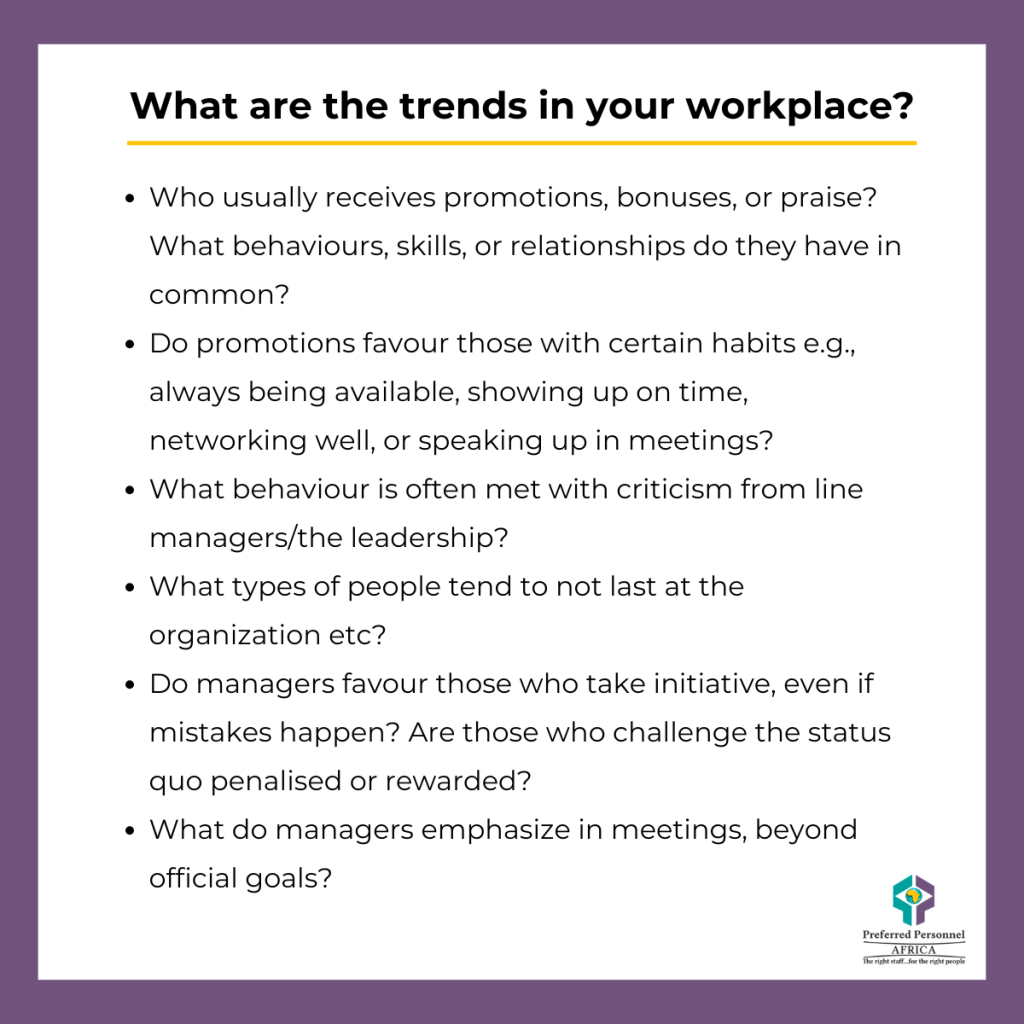By Leigh-Ann Athanasius
Have you found yourself in a situation at work where you are seemingly meeting all your targets but don’t seem to be growing in your career the way you would like to? You may have sensed something happening in the background of your workplace that feels important, but you can’t quite put your finger on it or peek behind the curtain? That feeling and stagnation could be down to you not knowing about the hidden KPIs within your organisation.
Hidden Key Performance Indicators (KPIs) are the unspoken performance metrics that influence decision-making, promotions, and workplace culture. Most times employees don’t even realise that these factors exist. Unlike formal KPIs, hidden KPI’s influence generally affect how employees are evaluated on a day-to-day basis.
These hidden KPIs are not there to intentionally trip you up, but the influence of them have in the workplace are undeniable. Here are a few of the types of hidden KPIs that may be in your workplace:
Cultural fit
Not the broader company culture, but individual, team and sometimes even department culture. If you were part of a sales team who tend to spend time together outside of work and you didn’t do that; how would that affect your team’s outlook on you? How would your line manager perceive your lack of attendance at after work events?
It may not seem like much, but being able to fit into the company culture (within reason) can be a powerful catalyser to your career success.
Responsiveness and adaptability
Beyond your job responsibilities, how quickly do you respond to emails or messages? How swiftly do you deal with customer complaints or even requests from your colleagues? How willing are you to take on extra work or help in urgent situations? How well do you handle change and uncertainty?
It seems like a small thing but being responsive and adaptable is an incredibly important skill to have in the workplace. It’s important to not adopt the “this is how I’ve always done it” or “this isn’t my job” mindset because it may be the hurdle to your success.
Perceived work ethic
Sometimes it is not about the actual output you produce but whether you “look busy”. How much time do you spend at the office or being online in remote work? While this may not be a common expectation, there is a perception that you are working harder when someone can actually see you working.
Attendance at non-mandatory meetings or events could reflect your work ethic. It shows that you are taking an interest in the organisation and are dedicated to what is happening even when you don’t need to be there. It’s also an opportunity to network with the other employees and supervisors particularly if you are part of a larger company. This increases your visibility in the workplace. It is easier to be recognised for your achievements if the relevant people know who you are.
How to Identify Hidden KPIs
As much as they are ‘hidden’, there are ways to figure out what your company values and how to use that to your advantage to ensure that you are always putting your best foot forward.
Notice trends
You can learn a lot by observing how other people are being evaluated and progressing in the company.

While it is good to know what to do to gain favour, it is just as important to know what not to do to avoid drawing negative attention to yourself. Listen to what leaders casually praise or criticise in conversations. This gives you the most insight into what the leadership of your organisation values over and above the actual output of your work.
Talk to your colleagues
It is probably easiest to learn from those who have been in the organisation longer than you have. They likely have the insight to longevity and success at the company.
Ask a trusted colleague, mentor, or former manager what they think really matters in performance evaluations. Do they know of any unwritten rules for career growth in the company? Some hidden KPIs are best learned through informal chats with those who understand company dynamics.
Pay attention to the small things
Your ability to fit into the social dynamic of the organisation may also affect your performance reviews. Are people expected to stay late, even if not formally required, socialise outside work hours, or be highly visible in meetings? Does the company value self-promotion, or do they prefer quiet contributors where you let the work speak for itself?
Identify whether such social expectations play a role in career progression and then ensure that you are aligned with it.
Test the waters
The best way to truly find out if there are hidden KPIs is to make minor adjustments to your behaviour and see if there are any positive results. Based on your observations, try implementing changes that you have noticed have worked well for others or are praised by the leadership. Maybe try speaking up more in meetings or volunteering for high-visibility projects or even strengthening relationships with colleagues and leadership.
If you notice a shift in recognition or opportunities, you’ve identified a hidden KPI! Experiment with different behaviours and track their impact on career growth. It may almost feel like you are playing a game, but it is better to align yourself with what is actually rewarded than going against it and getting frustrated with the way things are done.
Hidden KPIs influence who thrives in an organisation. While formal KPIs matter, hidden KPIs can make or break your career growth. Being aware of them allows you to navigate workplace dynamics more effectively and position yourself for success. Check out our article on exceeding expectations to further your career growth plans and ensure you are being noticed.



